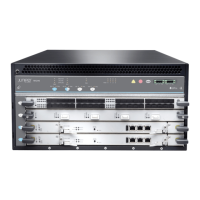7. Tighten the captive screws on the left and right of the Routing Engine.
8. Connect the management device cables to the Routing Engine.
The Routing Engine might require several minutes to boot.
After the Routing Engine boots, verify that it is installed correctly by checking the FAIL,
RE0, and RE1 LEDs on the craft interface. If the router is operational and the Routing
Engine is functioning properly, the green ONLINE LED lights steadily. If the red FAIL LED
lights steadily instead, remove and install the Routing Engine again. If the red FAIL LED
still lights steadily, the Routing Engine is not functioning properly. Contact your customer
support representative.
To check the status of the Routing Engine, use the CLI command:
user@host> show chassis routing-engine
Routing Engine status: Slot 0: Current state Master ...
For more information about using the CLI, see the Junos OS documentation.
Figure 117: Installing a Routing Engine
Related
Documentation
MX240 Routing Engine Description on page 23•
• Effect of Taking the MX240 Host Subsystem Offline
• Taking an MX240 Host Subsystem Offline
• Replacing Connections to MX240 Routing Engine Interface Ports on page 285
• Preventing Electrostatic Discharge Damage to an MX240 Router on page 444
• Synchronizing Routing Engines
Replacing an SSD Drive on an RE-S-1800
Each RE-S-1800 Routing Engine supports two solid-state drives (SSD) specified by
Juniper Networks. The RE-S-1800 ships with one SSD installed in the slot labeled SATA
Copyright © 2017, Juniper Networks, Inc.278
MX240 3D Universal Edge Router Hardware Guide

